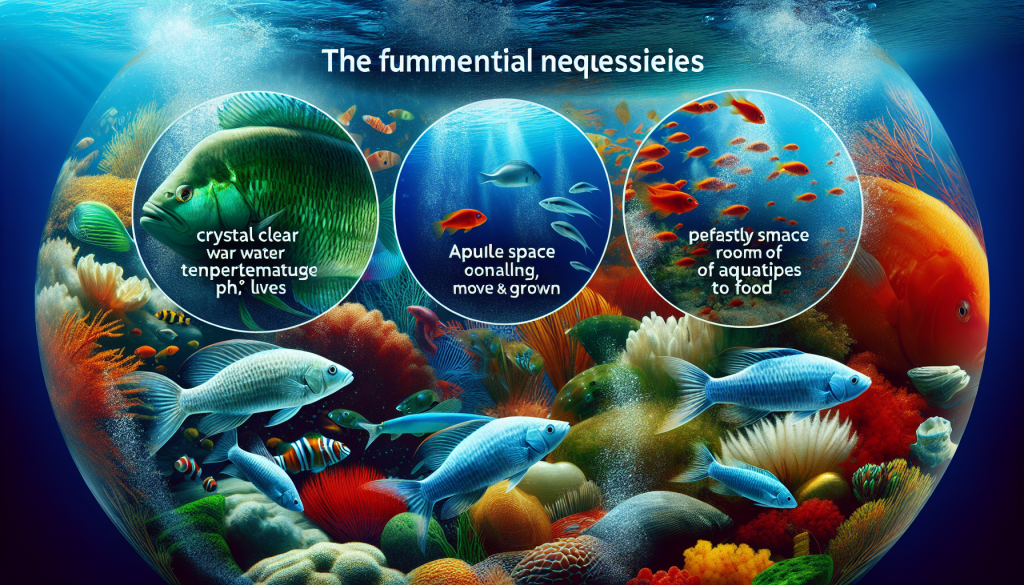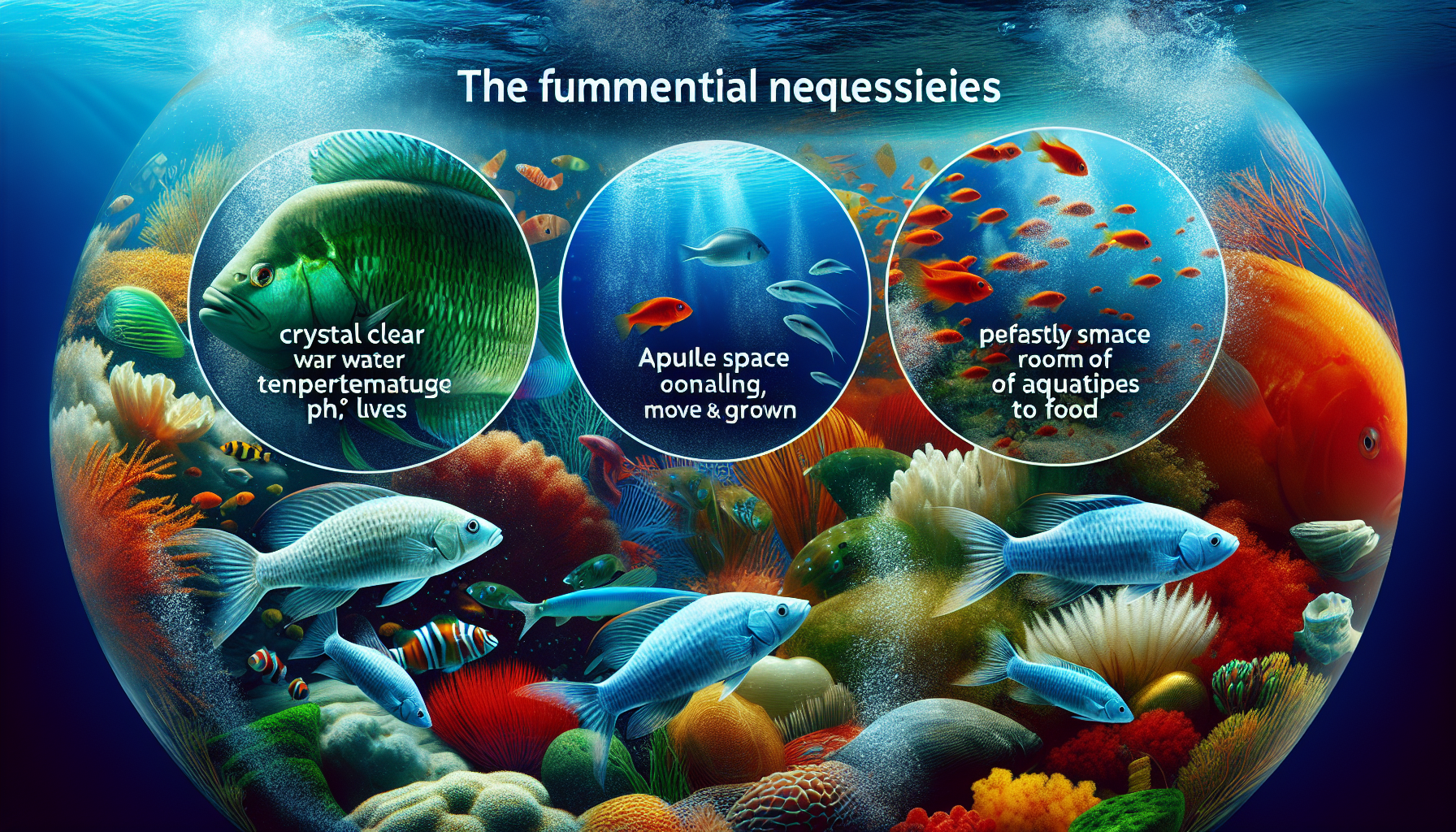Fish, like any other living creatures, have certain needs that must be met in order for them to thrive. From a comfortable habitat to a proper diet, there are a few essential elements that every fish requires to lead a healthy and fulfilling life. In this article, we will explore these fundamental needs and provide you with valuable insights on how to ensure your finned friends are happy and well-cared for. So, let’s dive into the underwater world and discover what every fish truly needs.
What Does Every Fish Need?
Owning fish as pets can be a rewarding and enjoyable experience. Whether you are a seasoned aquarium enthusiast or just starting out, it is important to understand exactly what your fish need to thrive and live a healthy life. In this article, we will explore the fundamental necessities that every fish requires to be happy and content in their environment.
Proper Tank Setup
One of the most essential factors to consider when caring for fish is providing them with a suitable tank setup. It is crucial to choose the right size tank for your specific species of fish. Different fish have varying needs when it comes to tank space, so it is important to research the requirements of your fish to ensure they have enough room to swim and explore.
Additionally, investing in high-quality aquarium equipment such as a filter, heater, and thermometer is crucial. A filter helps to maintain the cleanliness of the water, removing harmful substances and keeping the tank environment stable. The heater ensures that the water temperature remains consistent, mimicking the natural habitat of the fish. And a thermometer allows you to monitor the temperature closely, making adjustments if necessary.
A Suitable Diet
Providing your fish with a suitable diet is paramount to their overall health. Each species of fish has unique dietary requirements, so it is crucial to research and understand what your fish should be eating. Most commonly, fish are fed a diet of pellets or flakes specifically designed for their species. These foods are often nutritionally balanced and contain the necessary vitamins and minerals that fish need to thrive.
However, it is important to remember that not all fish eat the same diet. Some fish may require live or frozen foods such as brine shrimp or bloodworms to meet their dietary needs. Providing a varied diet ensures that your fish receive all the necessary nutrients and stay healthy.

Clean Water
Maintaining clean water is vital for the health and well-being of your fish. Fish produce waste through respiration and digestion, which can quickly accumulate in the tank if not properly addressed. Regular water changes are essential to remove these wastes and other pollutants that may build up over time.
In addition to water changes, using a proper water conditioner when refilling the tank is crucial. Water conditioners remove harmful chemicals and neutralize chlorine, ensuring that the water remains safe and suitable for the fish.
Proper Temperature
Maintaining the proper temperature is key to the survival of your fish. Different species of fish have different temperature requirements, so it is crucial to research the ideal range for your specific fish. The temperature of the tank should be kept within this range at all times.
Using a heater with a built-in thermostat helps maintain a consistent temperature, preventing any drastic fluctuations that can stress or harm the fish. It is advisable to regularly check the temperature of the water using a reliable thermometer to ensure it remains within the desired range.

Adequate Space
Providing fish with adequate space is essential for their comfort and well-being. Overcrowding a tank can lead to increased stress and aggression among fish, resulting in poor health and even death. Research the specific space requirements for your particular type of fish and ensure that they have enough room to swim and establish territories.
It is crucial to consider the adult size of each fish when determining the appropriate tank size. Some species may start out small but can grow quite large over time, requiring more space as they mature. Giving fish ample space reduces the chances of territorial disputes and promotes a harmonious environment.
Appropriate Lighting
Proper lighting is crucial for both the health of your fish and the overall aesthetics of the aquarium. Most fish require a consistent lighting schedule to simulate natural daylight patterns. Consult the specific lighting requirements for your fish, as some may require specific wavelengths or intensity of light.
In addition to providing light for the fish, live plants in the aquarium also benefit from proper lighting. Plants use light for photosynthesis, which helps maintain water quality by absorbing excess nutrients and producing oxygen. A well-lit tank enhances the overall beauty of the aquarium and creates a natural and visually appealing environment for your fish.
Regular Maintenance
Maintaining a clean and well-functioning aquarium requires regular maintenance. This includes tasks such as water changes, equipment cleaning, and general tank upkeep. Routinely checking the water parameters such as pH, ammonia, and nitrate levels is also important to ensure the water quality remains within safe limits.
Cleaning the tank regularly by removing any debris or uneaten food prevents the accumulation of waste that can lead to water quality issues. Equipment such as filters and heaters should be periodically cleaned and maintained to ensure their optimal performance. Investing time and effort into regular maintenance is crucial for the longevity and health of your fish.
Compatibility with Other Fish
When selecting fish for your aquarium, it is important to consider their compatibility with each other. Some fish are territorial or aggressive and may not coexist peacefully with certain species. Research the temperament and behavior of each fish species you wish to add to your tank to ensure they can live harmoniously together.
Additionally, consider the size of the fish you plan to keep together. Fish that are significantly larger may see smaller fish as prey or competition, leading to aggression and stress. Understanding the compatibility of different fish species helps create a balanced and peaceful environment for your aquatic pets.
Hideouts and Breeding Area
Providing suitable hiding spots and a breeding area is important for the mental well-being and reproductive success of certain fish species. Some fish prefer to have hiding spots where they can retreat when feeling stressed or threatened. This can be achieved by incorporating natural or artificial decorations such as caves, plants, or driftwood.
If you have fish that are known to breed, creating an area specifically designed for spawning is essential. This can be accomplished by adding a separate breeding tank or by providing specific spawning surfaces within the existing aquarium. Enabling natural and comfortable behaviors for your fish contributes to their overall happiness and reproduction.
Quality Water Filtration
Maintaining clean and properly filtered water is vital for the overall health and longevity of your fish. A good-quality water filter helps remove impurities and harmful substances from the water, keeping the environment safe and suitable for the fish.
There are various types of filters available, such as mechanical, chemical, and biological filters. Mechanical filters physically trap debris, while chemical filters use activated carbon to remove toxins. Biological filters house beneficial bacteria that break down harmful substances such as ammonia and nitrite. Choosing the appropriate filter for your tank size and fish requirements is crucial to maintain optimal water quality.
In conclusion, providing the necessities for your fish is essential for their well-being and happiness. A proper tank setup, a suitable diet, clean water, proper temperature, adequate space, appropriate lighting, regular maintenance, compatibility with other fish, hideouts, and breeding areas, and quality water filtration are all integral components of fish care. By understanding and meeting these requirements, you will create a thriving and vibrant aquatic ecosystem for your fish to enjoy. Happy fishkeeping!

My name is James Gheen, and I am thrilled to welcome you to Tropical Fish Farmers, the ultimate destination for everything related to tropical fish breeding. As an avid underwater enthusiast, I am dedicated to sharing my knowledge and experience to help you successfully breed and care for tropical fish. Whether you’re a beginner starting your aquarium journey or a seasoned breeder looking to expand your knowledge, my website has something for everyone. Dive into our extensive library of articles, tutorials, and videos covering various topics to enhance your breeding success. Join me in our vibrant community and let’s contribute to responsible fish breeding and conservation efforts together. Discover Tropical Fish Farmers and become part of our global community today.

